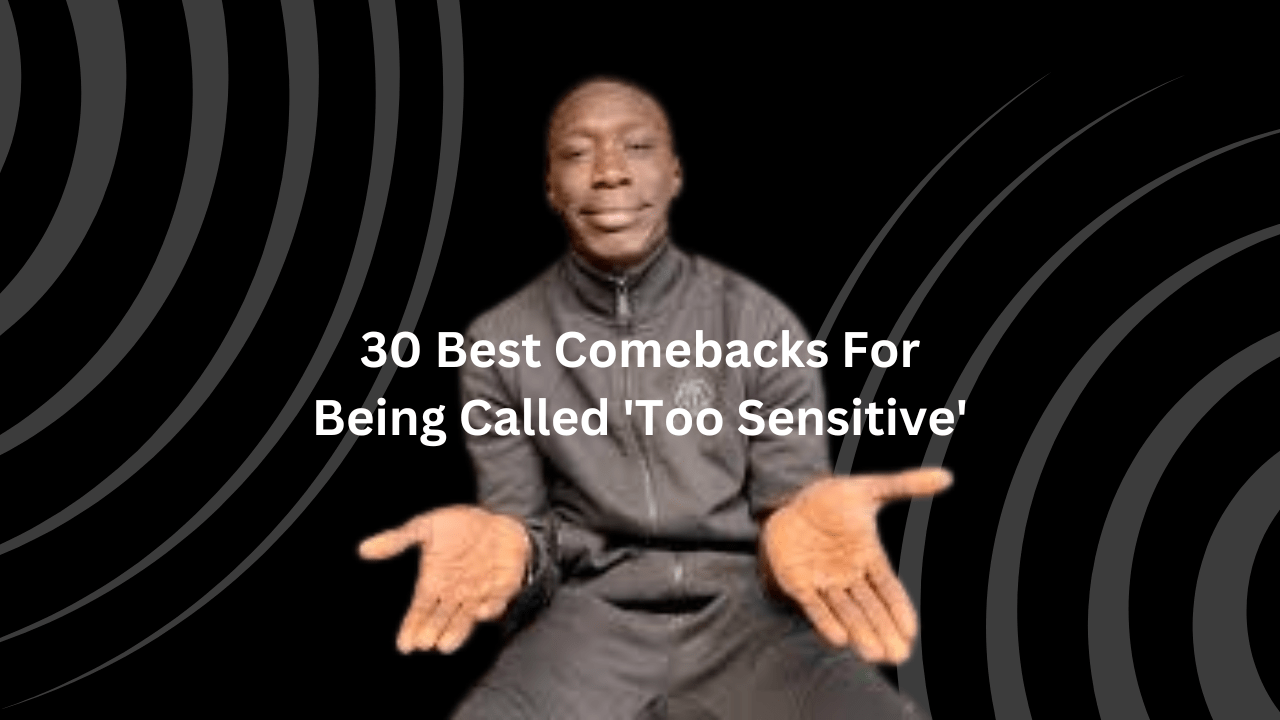Being labeled as “too sensitive” is a common experience for many individuals, often accompanied by feelings of invalidation and self-doubt. However, responding assertively to this label can help reclaim power and promote understanding of the value of sensitivity as a trait. In this article, we’ll explore 30 best comebacks for being called “too sensitive,” empowering individuals to assert boundaries and embrace their sensitivity with confidence.
Understanding the Label:

The label “too sensitive” can have significant implications, often dismissing individuals’ emotions and experiences as invalid or exaggerated. It can contribute to feelings of insecurity and self-doubt, leading individuals to question the validity of their own feelings. Recognizing the impact of this label is crucial in responding assertively and reclaiming power over one’s emotions and experiences.
Quick Tips for Assertive Responses:

Before diving into the comebacks, it’s essential to remember some quick tips for assertive responses:
Stay calm and composed: Responding calmly can help maintain control over the situation and convey confidence.
Assertively express your feelings and perspective: Communicate your emotions and experiences assertively, emphasizing their validity.
Set boundaries and assert your right to be treated with respect: Make it clear that dismissive or invalidating language is not acceptable and assert your right to be treated with respect.
Now, let’s explore 30 Best Comebacks for Being Called “Too Sensitive”:

“I prefer to see sensitivity as a strength rather than a weakness.”
This response reframes sensitivity as a positive attribute, asserting that it is not something to be ashamed of but rather embraced as a source of strength and depth.
“Being sensitive doesn’t mean I’m weak. It means I’m in touch with my emotions.”
This comeback challenges the misconception that sensitivity equates to weakness by emphasizing that it reflects emotional awareness and connection.
“My sensitivity allows me to empathize and connect with others on a deeper level.”
This response highlights the positive aspects of sensitivity, such as the ability to empathize and form meaningful connections with others.
“There’s nothing wrong with feeling deeply. It’s what makes us human.”
By emphasizing the universality of feeling deeply, this comeback asserts that sensitivity is a fundamental aspect of human nature that should be accepted and valued.
“I’d rather be ‘too sensitive’ than numb to the world around me.”
This response contrasts sensitivity with emotional numbness, suggesting that feeling deeply is preferable to being disconnected from one’s emotions and surroundings.
“Calling me ‘too sensitive’ won’t change the fact that my feelings are valid.”
This comeback asserts the validity of the individual’s emotions, regardless of how others may perceive or label them.
“I embrace my sensitivity as a gift that allows me to experience life fully.”
By framing sensitivity as a gift rather than a flaw, this response promotes self-acceptance and gratitude for the depth of emotional experience it brings.
“Being labeled ‘too sensitive’ only reflects the speaker’s lack of empathy, not my emotions.”
This comeback challenges the validity of the label by suggesting that it is a reflection of the speaker’s lack of empathy rather than an accurate assessment of the individual’s emotions
“Sensitivity is not a flaw to be fixed but a trait to be celebrated.”
This response asserts that sensitivity should be celebrated rather than criticized or viewed as a flaw in need of correction.
“Instead of labeling me, try to understand and appreciate my sensitivity.”
This comeback encourages empathy and understanding from the speaker, suggesting that they should seek to understand and appreciate the individual’s sensitivity rather than labeling it negatively.
“My sensitivity is not a weakness; it’s a superpower that allows me to understand others deeply.”
By reframing sensitivity as a superpower, this response emphasizes its strengths, such as the ability to understand others on a deep level and offer support and empathy.
“I refuse to apologize for feeling deeply and authentically.”
This comeback asserts the individual’s right to feel deeply and authentically without apology, challenging the notion that sensitivity is something to be ashamed of or apologized for.
“Your words may sting, but they won’t diminish the validity of my emotions.”
This response acknowledges the potential impact of hurtful words while asserting the resilience of the individual’s emotions and their refusal to be invalidated by others.
“I won’t let your judgment dull the brightness of my sensitivity.”
By metaphorically comparing sensitivity to brightness, this comeback asserts that the individual will not allow their sensitivity to be diminished by the judgment of others.
“Being sensitive means I experience life with depth and richness.”
This response highlights the positive aspects of sensitivity, such as the ability to experience life with depth and richness, suggesting that it enhances rather than detracts from the individual’s experiences.
“Don’t mistake my sensitivity for weakness. It takes strength to feel deeply.”
This comeback challenges the misconception that sensitivity equates to weakness by emphasizing the strength required to feel deeply and authentically in a world that often devalues emotions.
“I’d rather be called ‘too sensitive’ than indifferent to the world around me.”
This response contrasts sensitivity with indifference, suggesting that feeling deeply is preferable to being disconnected or apathetic towards one’s surroundings and experiences.
“I won’t let society’s standards dictate how I should feel or express myself.”
This comeback asserts the individual’s autonomy and refusal to conform to societal standards that may devalue or stigmatize sensitivity.
“Sensitivity is a beautiful aspect of my identity, not a flaw to be corrected.”
By framing sensitivity as a beautiful aspect of identity, this response promotes self-acceptance and challenges the notion that sensitivity is something to be corrected or changed.
“My sensitivity allows me to appreciate the beauty in the world and connect with others on a profound level.”
This response highlights the positive aspects of sensitivity, such as the ability to appreciate beauty and form deep connections with others, suggesting that it enriches rather than detracts from the individual’s life.
“Instead of criticizing my sensitivity, try to understand the value it brings to my life and relationships.”
This comeback encourages empathy and understanding from the speaker, suggesting that they should seek to understand and appreciate the value that sensitivity brings to the individual’s life and relationships.
“Your discomfort with my sensitivity is not my responsibility to manage.”
This response asserts the individual’s right to embrace their sensitivity without accommodating the discomfort it may cause others, challenging the notion that they should change or suppress their emotions to please others.
“I won’t apologize for feeling deeply and authentically. It’s what makes me who I am.”
This comeback emphasizes the importance of authenticity and self-acceptance, asserting that sensitivity is an integral part of the individual’s identity that they refuse to apologize for.
“Calling me ‘too sensitive’ won’t diminish the significance of my emotions.”
This response asserts the validity and significance of the individual’s emotions, regardless of how others may perceive or label them, challenging the notion that sensitivity is something to be dismissed or invalidated.
“My sensitivity is a part of me that I embrace with pride and acceptance.”
By promoting self-acceptance and pride in one’s sensitivity, this response challenges the stigma surrounding sensitivity and encourages individuals to embrace it as a valuable aspect of their identity.
“I won’t let your words invalidate the depth of my emotions.”
This comeback asserts the individual’s refusal to allow others’ judgments or criticisms to invalidate their emotions, emphasizing the importance of self-validation and acceptance.
“Sensitivity is not a weakness to be ashamed of but a strength to be celebrated.”
This response challenges the misconception that sensitivity is a weakness by emphasizing its strengths and positive attributes, encouraging individuals to celebrate rather than hide their sensitivity.
“I refuse to let your words invalidate the depth of my emotions.”
This response asserts the individual’s refusal to allow others’ judgments or criticisms to invalidate their emotions, emphasizing the importance of self-validation and acceptance.
“Being sensitive means I experience life with intensity and passion.”
By reframing sensitivity as a source of intensity and passion, this comeback highlights its positive aspects and suggests that it enhances rather than detracts from the individual’s experiences.
“I won’t apologize for being true to myself and honoring my sensitivity.”
This comeback asserts the individual’s commitment to authenticity and self-respect, refusing to apologize for embracing their sensitivity and staying true to themselves.
You may love this: 30 Slick Responses To Silence “I Was Just Asking” Excuse (Bold & Witty)
Tailoring Your Response:
When selecting a comeback, consider the context and relationship with the individual. Tailor your response to assert boundaries and promote understanding while maintaining self-respect and confidence. Remember that asserting your right to be treated with respect is essential in challenging the stigma surrounding sensitivity.
Importance of Embracing Sensitivity:
Sensitivity is a valuable trait that allows individuals to connect with others on a deeper level, empathize with their experiences, and appreciate the beauty in the world. By embracing sensitivity as a strength rather than a weakness, individuals can cultivate self-acceptance, confidence, and resilience in the face of criticism or judgment.
Conclusion:
Being called “too sensitive” can be a challenging experience, but responding assertively can help reclaim power and promote understanding of the value of sensitivity as a trait. By asserting boundaries, promoting self-acceptance, and challenging stigma, individuals can embrace their sensitivity with confidence and pride. So the next time you’re called “too sensitive,” remember these comebacks and assert your right to feel deeply and authentically.










